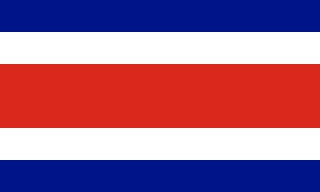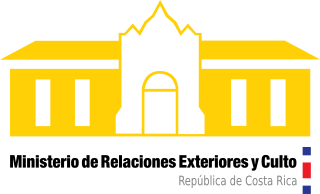This article needs additional citations for verification .(January 2020) |
| |||||
| Decades: | |||||
|---|---|---|---|---|---|
| See also: | |||||
This article needs additional citations for verification .(January 2020) |
| |||||
| Decades: | |||||
|---|---|---|---|---|---|
| See also: | |||||

Costa Rica, officially the Republic of Costa Rica, is a country in the Central American region of North America, bordered by Nicaragua to the north, the Caribbean Sea to the northeast, Panama to the southeast, the Pacific Ocean to the southwest, and maritime border with Ecuador to the south of Cocos Island. It has a population of around five million in a land area of 51,060 km2 (19,710 sq mi). An estimated 333,980 people live in the capital and largest city, San José, with around two million people in the surrounding metropolitan area.

The politics of Costa Rica take place in a framework of a presidential, representative democratic republic, with a multi-party system. Executive power is exercised by the president and their cabinet, and the President of Costa Rica is both the head of state and head of government. Legislative power is vested in the Legislative Assembly. The president and 57 Legislative Assembly deputies are elected for four-year terms. The judiciary operates independent of the executive and the legislature but remains involved in the political process. Costa Rica is a republic with a strong system of constitutional checks and balances. Voting is compulsory in Costa Rica but it is not enforced.

The president of the Republic of Costa Rica is the head of state and head of government of Costa Rica. The president is currently elected in direct elections for a period of four years, which is not immediately renewable. Two vice presidents are elected in the same ticket with the president. The president appoints the Council of Ministers. Due to the abolition of the military of Costa Rica in 1948, the president is not a commander-in-chief, unlike the norm in most other countries, although the Constitution does describe him as commander-in-chief of the civil defense public forces.

The Confederation of North, Central America and Caribbean Association Football, abbreviated as CONCACAF, is one of FIFA's six continental governing bodies for association football. Its 41 member associations represent countries and territories mainly in North America, including the Caribbean and Central America, and, for geopolitical reasons, three nations from the Guianas subregion of South America—Guyana, Suriname, and French Guiana. The CONCACAF's primary functions are to organize competitions for national teams and clubs, and to conduct the World Cup and Women's World Cup qualifying tournaments.

Elizabeth Odio Benito is a lawyer and politician from Costa Rica. She served as President in the Inter-American Court of Human Rights from 2018 to 2020. She was a Vice-President of the International Criminal Court. She previously served as a judge on the International Criminal Tribunal for the Former Yugoslavia, and in her home country of Costa Rica was twice appointed Justice Minister, later becoming Vice-President of the Republic. Her background is as an academic lawyer, specialising in the administration of justice and human rights, in particular the rights of women.

The University of Costa Rica is a public university in the Republic of Costa Rica, in Central America. Its main campus, Ciudad Universitaria Rodrigo Facio, is located in San Pedro Montes de Oca, in the province of San José. It is the oldest and largest institution of higher learning in Costa Rica, originally established as the Universidad de Santo Tomás in 1843. It is also the most important research university in the country and Central America and is counted among the most prestigious universities of Latin America. Approximately 45,000 students attend UCR throughout the year.

Costa Rica elects on national level a head of state, the president, and a legislature. The President of Costa Rica is, together with two vice-presidents, elected for a four-year term by the people. The Legislative Assembly (Asamblea Legislativa) has 57 members, elected for four-year terms by closed list proportional representation in each of the country's seven provinces.

Ricardo Juan Antonio Saprissa Aymá was a lifelong athlete, coach, and promoter of sports. After being raised in El Salvador, he spent many years in Costa Rica, playing and coaching football. In 1935 he was co-founder of Deportivo Saprissa, a highly successful football team based in San Juan de Tibás. He also represented Spain at the 1924 Summer Olympics.

The 1949 Constitution of Costa Rica established two vice-presidencies of Costa Rica, which are directly elected through a popular vote on a ticket with the president for a period of four years, with no immediate re-election. There has been various incarnations of the office. Vice presidents replace the president in cases of temporary or permanent absence.

Laura Chinchilla Miranda is a Costa Rican political scientist and politician who served as President of Costa Rica from 2010 to 2014. She was one of Óscar Arias Sánchez's two Vice-Presidents and his administration's Minister of Justice. She was the governing PLN candidate for president in the 2010 general election, where she won with 46.76% of the vote on 7 February. She was the eighth woman president of a Latin American country and the first woman to become President of Costa Rica. She was sworn in as President of Costa Rica on 8 May 2010.

Epsy Alejandra Campbell Barr is a Costa Rican politician and economist who served as the Vice-president of Costa Rica from 8 May 2018 to 8 May 2022. She is the first woman of African descent to be vice president in Costa Rica and in Latin America.

General elections were held in Costa Rica on 7 February 2010. The ruling party before the election, the center-left National Liberation Party, put forward former Vice-President Laura Chinchilla as its presidential candidate, while the libertarian, Movimiento Libertario nominated former legislator Otto Guevara. Opinion polls before voting started consistently put Chinchilla as the front-runner, a trend confirmed in the election-night count, which showed her garnering 46.76% of the vote.

The 2006 Costa Rica local elections were held on December 3, 2006. In the February 2006 general elections, Costa Rica elected president, vice-presidents, deputies of the Legislative Assembly and municipal councilors in the general elections. The December 2006 elections were held to elect cantonal mayors, members of the District Councils of each of the nation’s districts and intendants of eight special autonomous districts and islands.

The First Costa Rican Republic is the name given to the historical period between the proclamation of the Republic of Costa Rica in the 1848 reformed Constitution and the official decree by then President José María Castro Madriz on 31 August 1848 and the Costa Rican Civil War of 1948 which ended with the enactment of the current 1949 Constitution on 7 November 1949 starting the Second Costa Rican Republic.

Costa Rica competed at the 2020 Summer Olympics in Tokyo. Originally scheduled to take place from 24 July to 9 August 2020, the Games were postponed to 23 July to 8 August 2021, because of the COVID-19 pandemic. It was the nation's sixteenth appearance at the Summer Olympics, since its debut in 1936.
Events in the year 2020 in Costa Rica.

General elections were held in Costa Rica on 6 February 2022, to elect the president, two vice-presidents, and all 57 deputies of the Legislative Assembly. As none of the presidential nominees obtained at least 40% of the votes, a runoff was held on 3 April 2022, between the top two candidates, José María Figueres and Rodrigo Chaves Robles.

The Ministry of Foreign Affairs and Worship is the ministry in charge of the foreign policy of Costa Rica, including the management of diplomatic missions around the world and their personnel.
Events in the year 2021 in Costa Rica.
Events in the year 2022 in Costa Rica.